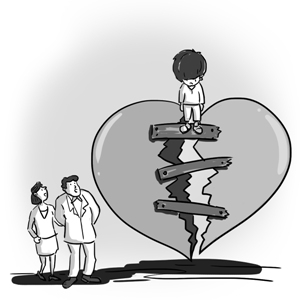
Illustration: Chen Xia/GT
When almost all of the public attention has focused on the unprecedented air pollution in Shanghai in the past week, I am more concerned about the news of a runaway 13-year-old boy.
The boy reportedly ran away from home at about 9 pm on December 6 in Yangpu district. It was a Friday night. According to the statement issued by local police, when he left home, he was still wearing his school uniform. There were not many details in the 140-word microblog.
Hundreds of people re-tweeted the post and finally at about 8 am on December 11, the boy was found in a McDonald's alone on the Bund in downtown Huangpu district. It's hard to imagine how the parents had spent the previous five days and nights.
It so happens that my daughter is also 13 years old. Quite probably, the boy is, like her, in grade 7 at junior middle school. As a mother, I have often found it difficult to communicate effectively with her. Sometimes even before I start to say something, she interrupts and retreats to her room with an expression that says "leave me alone."
Based on my own experience, I assume that there was a dispute between the parents and the boy that Friday. It's common for parents to enquire about their child's school performance over the week on a Friday evening. In some schools, teachers will send parents a weekly review of students or test papers which the parents are required to sign to show that they have seen it.
For parents, it's a good way to monitor their child's performance at school. But for students, especially those who get low marks in exams or misbehave on campus, it's a bad practice. If the parents are patient and rational, they will listen to their child explain first, giving him or her a chance of self-defense. If a problem does exist, it's no use to just criticize the child. The next important step should be how to solve the problem, something that the child, parents and teachers all need to do together.
An ideal scenario is that all the problems get solved after joint efforts. But in reality, it's an ongoing challenge for all students and families.
We have to admit that it's a huge undertaking to perform well in Chinese schools. Studying has become a joint venture between families and schools. In last week's column I noted that the top marks achieved by Shanghai students on the international PISA assessment were gained at the cost of extra tutoring fees and fewer sleeping hours.
After nine years of compulsory education in Shanghai, only about 50 percent of students will be admitted by senior middle schools where they must study three more years to prepare for the gaokao, China's notoriously tough national college entrance exams. The remaining 50 percent of students will be diverged to vocational schools where they learn a money-earning skill in three years. According to statistics on the Shanghai Municipal Education Commission's website, 81,000 students completed the nine years of compulsory education this year. The vast majority, 98 percent, go on to study at senior middle school or vocational school.
However, almost half of the families have to give up the "university dream" as early as grade nine.
Now let's return to the runaway schoolboy case. It's time for the parents to reconsider many things.
There is much room for improvement as far as communication between parents and child is concerned. In order to avoid a similar experience in the future, they should evaluate their own behavior first. Have they set reasonable and practical targets for the child? Is it time to make adjustments? Have they listened to their child's point of view? Are they willing to listen to him now and pay attention to his feelings?
I would say later is better than never. In fact, in recent years we have frequently heard bad news concerning school children. Students from primary school to university have committed suicide. Much more importance has been attached to their school performance than their psychological well-being.
An aptitude for academic learning only constitutes a small part of one's life, which is simply common sense that most parents know. But in reality, they still blindly pursue high marks, ignoring the suffering of their child.
The fact that only half of junior middle school graduates will be admitted by senior middle schools is not widely known among parents. Thus many parents who can afford the cost of tuition will take it for granted that their children will go on to study at university since so many others are admitted by universities every year.
This reality should be made known to the public, so that correct decisions can be made as early as possible to help family relations be harmonious.
I do hope parents learn lessons from these sad stories. At least, I have learnt a lot. We parents are always pushing our children "for their sake." We tell them they will understand in the future, but if we can't guarantee a good present, how can we speak of the future?
The author is the managing editor of Global Times Metro Shanghai. fengyu@globaltimes.com.cn

